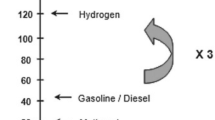Abstract
Recently, we have witnessed that type-2 fuzzy has surpass the performance of type-1 in real-world scenarios. For this reason, it is interesting to investigate the area of type-3 fuzzy theory, and in this work, we are dealing with the application side of this theory. We illustrate the impact of type-3 in surface quality control. The method uses interval type-3 fuzzy to automate quality control. Surface roughness and porosity of the materials are utilized to estimate the quality of the material with a type-3 fuzzy approach. Material manufacturing needs accurate quality control and a type-3 approach is able to show superiority over type-2 and type-1 in this case.
Access this chapter
Tax calculation will be finalised at checkout
Purchases are for personal use only
Similar content being viewed by others
References
Zadeh, L. A. (1989). Knowledge representation in Fuzzy Logic. IEEE Transactions on knowledge data engineering, 1, 89.
Zadeh, L. A. (1998). Fuzzy Logic. Computer, 1(4), 83–93.
Mendel, J. M. (2001). Uncertain Rule-Based Fuzzy Logic Systems: Introduction and New Directions. Prentice-Hall.
Mendel, J. M. (2017). Uncertain Rule-Based Fuzzy Logic Systems: Introduction and New Directions (2nd ed.), Springer.
Karnik, N. N., & Mendel, J. M. (2001). Operations on Type-2 fuzzy sets. Fuzzy Sets and Systems, 122, 327–348.
Moreno, J. E., et al. (2020). Design of an interval Type-2 fuzzy model with justifiable uncertainty. Information Sciences, 513, 206–221.
Mendel, J. M., Hagras, H., Tan, W.-W., Melek, W. W., & Ying, H. (2014). Introduction to Type-2 Fuzzy Logic Control. NJ. Wiley and IEEE Press.
Olivas, F., Valdez, F., Castillo, O., & Melin, P. (2016). Dynamic parameter adaptation in particle swarm optimization using interval Type-2 fuzzy logic. Soft Computing, 20(3), 1057–1070.
Sakalli, A., Kumbasar, T., & Mendel, J. M. (2021). Towards systematic design of general Type-2 Fuzzy Logic Controllers: Analysis, interpretation, and tuning. IEEE Transactions on Fuzzy Systems, 29(2), 226–239.
Ontiveros, E., Melin, P., & Castillo, O. (2018). High order α-planes integration: A new approach to computational cost reduction of General Type-2 Fuzzy Systems. Engineering Applications of Artificial Intelligence, 74, 186–197.
Castillo, O., & Amador-Angulo, L. (2018). A generalized type-2 fuzzy logic approach for dynamic parameter adaptation in bee colony optimization applied to fuzzy controller design. Information Sciences, 460–461, 476–496.
Cao, Y., Raise, A., Mohammadzadeh, A. et al. (2021). Deep learned recurrent type-3 fuzzy system: Application for renewable energy modeling / prediction. Energy Reports.
Mohammadzadeh, A., Castillo, O., Band, S. S., et al. (2021). A novel fractional-order multiple-model Type-3 Fuzzy Control for nonlinear systems with unmodeled dynamics. International Journal of Fuzzy Systems. https://doi.org/10.1007/s40815-021-01058-1
Qasem, S. N., Ahmadian, A., Mohammadzadeh, A., Rathinasamy, S., & Pahlevanzadeh, B. (2021). A Type-3 logic fuzzy system: Optimized by a correntropy based Kalman filter with adaptive fuzzy kernel size Inform. Science, 572, 424–443.
Rickard, J. T., Aisbett, J., & Gibbon, G. (2009). Fuzzy subsethood for fuzzy sets of Type-2 and generalized Ttype-n. IEEE Transactions on Fuzzy Systems, 17(1), 50–60.
Mohammadzadeh, A., Sabzalian, M. H., & Zhang, W. (2020). An interval Type-3 fuzzy system and a new online fractional-order learning algorithm: Theory and practice. IEEE Transactions on Fuzzy Systems, 28(9), 1940–1950.
Liu, Z., Mohammadzadeh, A., Turabieh, H., Mafarja, M., Band, S. S., & Mosavi, A. (2021). A new online learned Interval Type-3 Fuzzy Control system for solar energy management systems. IEEE Access, 9, 10498–10508.
Amador-Angulo, L., Castillo, O., Melin, P., & Castro, J. R. (2022). Interval Type-3 Fuzzy adaptation of the bee colony optimization algorithm for optimal Fuzzy Control of an autonomous mobile robot. Micromachines, 13(9), 1490. https://doi.org/10.3390/mi13091490
Castillo, O., Castro, J. R., & Melin, P. (2022). Interval Type-3 Fuzzy Control for automated tuning of image quality in televisions. Axioms, 11, 276. https://doi.org/10.3390/axioms11060276
Castillo, O., Castro, J. R., & Melin, P. (2022). Interval Type-3 Fuzzy systems: Theory and design. Studies in Fuzziness and Soft Computing, 418, 1–100.
Castillo, O., Castro, J. R., & Melin, P. (2022). A methodology for building interval type‐3 fuzzy systems based on the principle of justifiable granularity. International Journal of Intelligent Systems.
Castillo, O., Castro, J. R., & Melin, P. (2022). Interval Type-3 Fuzzy aggregation of neural networks for multiple time series prediction: The case of financial forecasting. Axioms, 11(6), 251.
Cervantes, L., & Castillo, O. (2015). Type-2 fuzzy logic aggregation of multiple Fuzzy Controllers for Airplane Flight Control. Information Sciences, 324, 247–256.
Castillo, O., & Melin, P. (2003). Soft Computing and Fractal Theory for Intelligent Manufacturing. Springer.
Castillo, O., Castro, J. R., Melin, P., & Rodriguez-Diaz, A. (2014). Application of interval Type-2 fuzzy neural networks in non-linear identification and time series prediction. Soft Computing, 18(6), 1213–1224.
Rubio, E., Castillo, O., Valdez, F., Melin, P., Gonzalez, C. I., & Martinez, G. (2017). An extension of the fuzzy possibilistic clustering algorithm using Type-2 fuzzy logic techniques. Advances in Fuzzy Systems. https://doi.org/10.1155/2017/7094046
Melin, P., Miramontes, I., & Prado-Arechiga, G. (2018). A hybrid model based on modular neural networks and fuzzy systems for classification of blood pressure and hypertension risk diagnosis. Expert Systems with Applications, 107, 146–164.
Author information
Authors and Affiliations
Corresponding author
Editor information
Editors and Affiliations
Rights and permissions
Copyright information
© 2023 The Author(s), under exclusive license to Springer Nature Switzerland AG
About this chapter
Cite this chapter
Castillo, O., Melin, P. (2023). Interval Type-3 Fuzzy Decision Making in Material Surface Quality Control. In: Castillo, O., Melin, P. (eds) Hybrid Intelligent Systems Based on Extensions of Fuzzy Logic, Neural Networks and Metaheuristics. Studies in Computational Intelligence, vol 1096. Springer, Cham. https://doi.org/10.1007/978-3-031-28999-6_29
Download citation
DOI: https://doi.org/10.1007/978-3-031-28999-6_29
Published:
Publisher Name: Springer, Cham
Print ISBN: 978-3-031-28998-9
Online ISBN: 978-3-031-28999-6
eBook Packages: Intelligent Technologies and RoboticsIntelligent Technologies and Robotics (R0)




